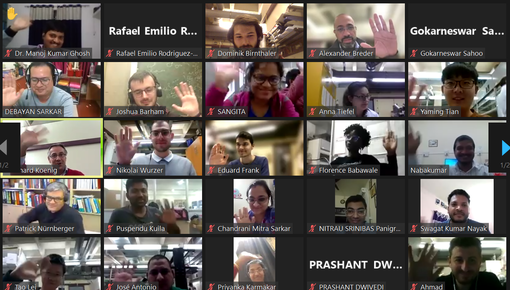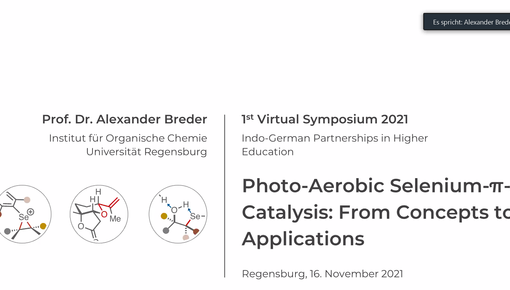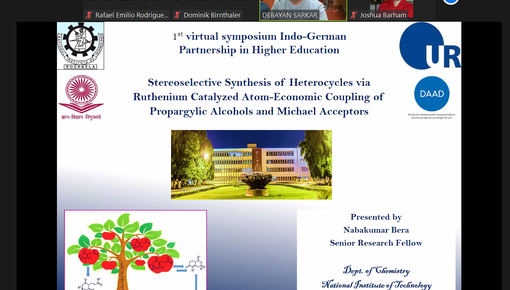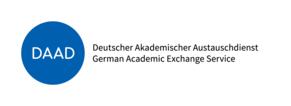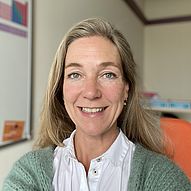
DIP Regensburg - Indore
Deutsch-Indische Partnerschaften in der Hochschulzusammenarbeit (DIP)
Indo-German Partnerships in Higher Education (IGP)
Chemical Innovations for a Sustainable Future |
The DIP offers several, greatly supported exchange opportunities to Master and PhD students of chemistry, biochemistry, and business chemistry. Interested students should contact us for more information.
About the project
Chemistry is the science of the transformation of matter and is therefore of essential importance for achieving the “Sustainable Development Goals” SDGs of the United Nations. Many SDGs can only be achieved through a different, more sustainable chemistry. With this project the framework is created for the necessary development of innovative teaching and research concepts. More than ever, there is a need for a global circular economy to avoid the accumulation of waste and the depletion of natural resources. All future chemical technologies and products must be inherently safe and sustainable. “Sustainable chemistry” aims to improve the efficiency of natural resources that are used to meet human needs for chemical products and services. It encompasses the development, manufacture and use of efficient, effective, safer and more environmentally friendly chemical products and processes. In this way, this chemical branch stimulates innovations in all sectors in order to develop new chemicals, production processes and processes for product stewardship that enable an increase in performance and value while at the same time providing the best possible protection for the environment and human health or their improvement. Sustainable chemistry is essentially about doing more with less, optimizing the use of finite resources and minimizing waste.
The Faculty of Chemistry at the Indian Institute of Technology Indore (IIT Indore) and the Faculty of Chemistry and Pharmacy at the University of Regensburg are working together to better prepare the next generation of chemists for the challenges of the 21st century. The overarching goal is to convert all technologies on earth into circular processes, which requires a fundamentally different way of thinking from scientists. This not only requires an innovative scientific education, but also a better understanding between societies and cultures in order to create a global awareness of the tasks and responsibilities that lie ahead of us. The project is intended to intensify the existing research cooperation between the two institutions involved in Germany and India and to put it on a broader basis by including further partners from science and industry. While individual working groups on the German and Indian sides have previously pursued joint research projects, in the future research projects will be brought together and newly established at both institutions under the overarching goal of sustainable chemistry. At the level of the Master’s Chemistry degree program, relevant topics are to be increasingly included in the curriculum at both universities. In addition, there will be exchange activities for graduates, doctoral students, postdocs and teachers over the next four years. In joint symposia, sustainable chemistry in the context of the SDGs will be discussed with experts from science and business (international), thus raising awareness of the topic among students, teachers, researchers and the general public.
Previous Events - NIT Rourkela
Virtual Symposium November 2021
The first virtual webinar gave insight to ongoing research at both institutions. Two exciting lectures were held by Prof. Gokarneswar Sahoo and Prof. Alexander Breder followed by four presentations from graduate and postgraduate students.
Programme:
Welcome (by Prof. Debayan Sarkar and Prof. Burkhard König)
Scientific Lectures:
Prof. Gokarneswar Sahoo “Umpolung of Cationic Bromine: Organocatalyzed Halogenation of olefins”
Prof. Alexander Breder „Photo-Aerobic Selenium-π-Acid Catalysis: From Concepts to Applications“
Short presentations
Barnali Roy “Tribromide: Aid to Diverse Oxidative Transformations”
Rafael Rodriguez “Xanthine-Based α-Diimines: Synthesis, Coordination Chemistry and Applications in Photocatalysis”
Nikolai Wurzer “Heck-Type Coupling of Fused Bicyclic Vinylcyclopropanes:
Synthesis of 1,2-Dihydropyridines, 2,3-Dihydro 1H azepines, 1,4-Cyclohexadienes, and 2H Pyrans”
Nabakumar Bera “Stereoselective Synthesis of Heterocycles via Ruthenium Catalyzed Atom-Economic Coupling of Propargylic Alcohols and Michael Acceptors”
Concluding remarks
Kick-off Meeting
The virtual kick-off meeting took place via Zoom on Monday, October 26th, 2020.
Moderation: Prof. Dr. Burkhard König, Dr. Petra Hilgers, project coordination Regensburg
Welcome addresses
- Vice president University of Regensburg, Prof. Dr. Ursula Regener (5 min)
- Director National Institute of Technology, Rourkela, Prof. Dr. Animesh Biswas (5 min)
- Head of Chemistry department, NIT Rourkela, Prof. Dr. Rupam Dinda (5 min)
- Dean of the faculty of Chemistry and Pharmacy, Regensburg, Prof. Dr. Jörg Heilmann (5 min)
- Dean of the faculty welfare, NIT Rourkela, Prof. Dr. Susmita Das (5 min)
Scientific overview of the collaborating faculties
- Dean of research, faculty of Chemistry and Pharmacy, Regensburg, Prof. Dr. Oliver Reiser (10 min)
- Head Foundation of Technology & Business Incubation (FTBI), Prof. Dr. Debayan Sarkar (10 min)
- Dean Sponsored Research, NIT Rourkela, Prof. Ritwik Sarkar (5 min)
Exemplary research projects at the faculty of Chemistry and Pharmacy, Regensburg and the Department of Chemistry NIT, Rourkela
- Prof. Dr. Robert Wolf (10 min)
- Dr. Joshua Barham (10 min)
- Prof. Dr. Julia Rehbein (10 min)
- Prof. Rupam Dinda (10 min)
- Prof. M. Jana (10 min)
- Short presentation by Mr. Chiranjibi Samal highlighting Rourkela and the forth-coming Conference (5 min)
Closing remarks
Prof. Dr. Burkhard König, Prof. Dr. Debayan Sarkar
